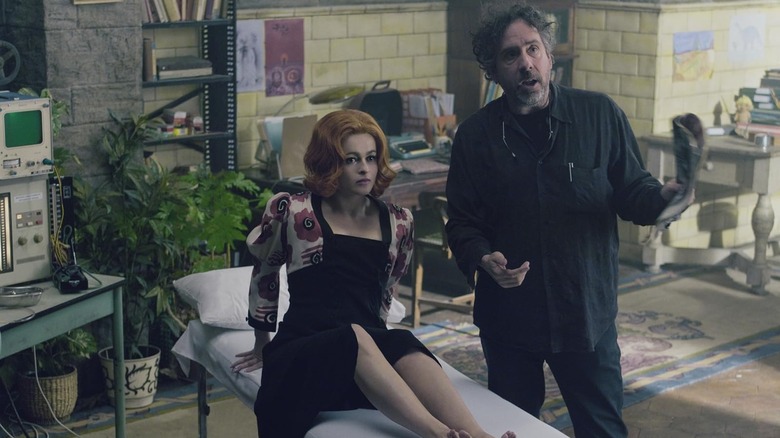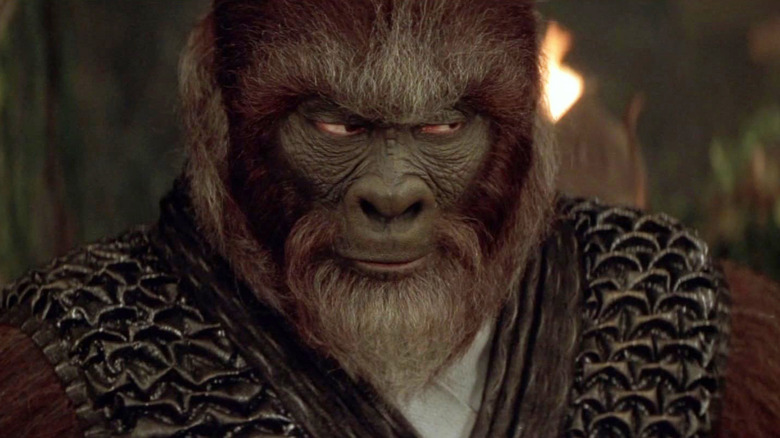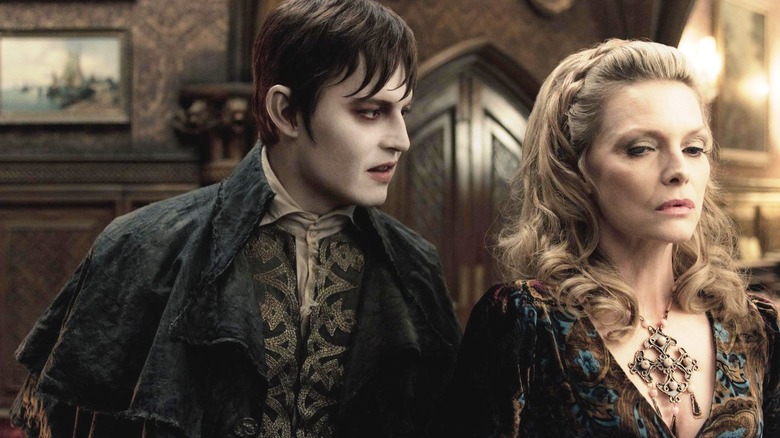Tim Burton's Two Worst Movies, According To Rotten Tomatoes
Tim Burton rose during a very peculiar time in popular culture. The terse, depressive adult dramas of the 1970s had given way to the ultra-slick, spectacle-heavy blockbusters of the 1980s as a new generation of adventure films entered the marketplace, helmed by precocious filmmakers who spent their youths in actual film schools. At the same time, the financial and cultural conservatism of the Reagan administration had amplified the voices of rebellious punkers and enterprising artistic weirdos who wanted nothing to do with the commercial world. The odd circumstances — an increase of money paired with a general antiestablishment malaise — were just right for anti-mainstream freaks to break into the public eye.
All of a sudden, filmmakers like David Lynch, Tobe Hooper, and Paul Verhoeven could make big hits, and Tim Burton could be embraced by the public at large. Burton, in particular, could not have risen to fame in any other epoch.
Burton was a child of B-movies and helped birth the Goth movement, along with Bauhaus and Siouxsie Sioux. Lydia Deetz, the character played by Winona Ryder in Burton's 1988 film "Beetlejuice," became an icon of Goths everywhere, and Burton's semi-whimsical, semi-depressive, death-facing, cartoon-loving weirdness caught on around the globe. He redefined Batman, making the hero a Gothic, expressionistic antihero, and he told many tales of wistful romance between oddballs and outsiders.
Eventually, though, audiences became tired of his output, and many began rejecting his work. Since about 2000, it seemed like Burton, rather than pursuing projects that interested him, was merely plugged into extant IP that fit his sensibilities already. Some of these latter Burton films were not welcomed with open arms, and some have even been outright panned. Burton always put his heart into a film's design, costumes, and quirky visuals, but he wasn't always working with good ideas or screenplays.
Of all of Burton's features, though, his remake of "Planet of the Apes" and his adaptation of "Dark Shadows" received the worst notices.
Planet of the Apes (2001)
Burton's reworking of Pierre Boulle's novel "Planet of the Apes," previously adapted into a successful media franchise that kicked off in 1968, is one of the best-looking in his filmography. Burton spent a great deal of time with makeup designers and movement coaches to make sure human actors looked realistically like gorillas, orangutans, and chimpanzees. One might not find better practical makeup effects in a mainstream movie. Also, the ape world was appropriately detailed and had a unique visual texture and architecture, making it palpable and gorgeous.
The problem with "Planet of the Apes" was that the script was terrible and the lead actor was miscast. Mark Wahlberg played the central human astronaut in the story, but he lacked the charisma of a traditional sci-fi hero, which was clearly what the story needed. Estella Warren was also awful as a woman who lives in the woods, but who clearly had easy access to lip gloss. The apes were more important than the humans, and one might have wondered why Burton required humans in the story at all.
On Rotten Tomatoes, "Planet of the Apes" has a mere 43% approval rating based on 201 reviews. Joe Morgenstern, writing for the Wall Street Journal, felt that the film was sloppy and disjointed, while Todd McCarthy, writing for Variety, called it listless and witless. Manohla Dargis criticized Wahlberg's performance, while Roger Ebert gave it a close-but-no-cigar two-and-a-half stars. Many consider it to be the worst of the "Apes" movies, but that can't possibly be true in a world with "Battle for the Planet of the Apes" in it.
Dark Shadows (2012)
I have gone on record to defend "Dark Shadows," feeling like Burton captured a certain element of camp that was always an intrinsic part of the soap opera on which it was based. Burton allowed his characters to overact and be theatrical, all while recreating the stilted, stodgy camera placement of a 1960s daily drama. The original "Dark Shadows" aired from 1966 to 1971, lasting six seasons and a whopping 1,225 episodes. The show, because of its speedy production, was sloppy and overwrought, and Burton rolled with its reputation, making something equally overwrought.
Many, however, didn't get the joke, or merely didn't find it very funny. There was a lot of fish-out-of-water humor — the film's lead character, the vampire Barnabas Collins (Johnny Depp), is buried in 1760 and awakened in 1972 — and many critics found the gags to be trite, obvious and tiresome. "Dark Shadows" is, to this day, Burton's worst-reviewed film, boasting a 35% approval rating on Rotten Tomatoes based on 263 reviews.
J. Hoberman, writing for ARTINFO, noted that the story in "Dark Shadows" was way too complicated — there are tales of romantic revenge, but also a lot about who gets to run the Collins businesses — and that there were too many characters. Anthony Lane, writing for the New Yorker, understood the soap opera satire, but didn't think it had much of a point in an era when soap operas were no longer a notable cultural force; why take the piss out of something that is already dying? Eric D. Snider, writing for Film.com, was particularly harsh, saying that the film "can't decide whether it's a parody, a horror comedy, an atmospheric melodrama, or a tedious bucket of crap. Eventually, it chooses the last one."
Other low-rated Burton films included his remake of "Dumbo" (46%), his overstuffed "Alice in Wonderland" (51%), and his chaotic work of genius "Mars Attacks!" (56%).


